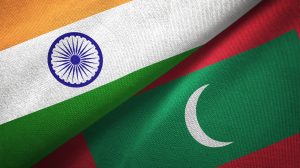The Maldives relationship with India has habitually oscillated between support and opposition. Currently certain domestic elements in the Maldives have skillfully attempted to drive the relationship to a nadir by driving anti-India sentiments. Unfortunately, on this occasion India has yet again been a victim of the internal political situation in the Maldives. India plays a critical role in economic, defense, and humanitarian sectors in the Maldives and will continue to do so despite the campaign. Only a change in political leadership and government might affect the capacity of India’s affairs with the Maldives.
According to Ahmed Azaan, co-founder of Maldivian online news outlet Dhiyares, the “India Out” campaign is a call for the removal of the Indian military from the Maldives. “It is not a call to cut off diplomatic & trade relations with India,” he said in a tweet. Azzan added that the Maldives “should be able to forge ties with India without undermining our sovereignty.” In several other tweets, Azaan expresses displeasure at India’s military presence in the Maldives and equates it to a loss of the Maldives’ sovereignty.
The hashtag “India Out” is still trending on Twitter in the Maldives as of July 26, the Maldives’ Independence Day.
This anti-India sentiment can be traced back to when Abdulla Yameen of the Progressive Party of Maldives (PPM) became president in 2013. The sentiment toned down when Ibrahim Solih took over as president, but since last year it has reared its ugly head again.
The current narrative harkens back to certain decisions made during the Yameen government, such as the return of two Dhruv Advanced Light Helicopters (ALF) helicopters that were gifted by India to the coast guard. The helicopters, based in Addu Atoll and at Hanimaadhoo, were used for benign purposes such as ocean search-and-rescue operations and maritime weather surveillance. The government then criticized India’s proclivity for military intervention as an affront to its sovereignty and accused New Delhi of harboring ambitions to engulf the island when domestic politics became unstable and former President Mohammed Nasheed requested India intervene.
Although India yearns for greater defense cooperation with the Maldives to curb Chinese advances in the region, the reality is that it does not have a military base, or a significant number of troops stationed in the islands and atolls to warrant an accusation of imperialism.
The campaign has reached a point where the security of Indian diplomatic staff is of concern. Sunjay Sudhir, New Delhi’s de facto ambassador to the Maldives, had written to Male’s foreign ministry requesting extra security personnel and urging the local authorities to act. There are reasons to believe the credibility of the request. A call was made a few months ago to protest outside the High Commission of India in the Maldives in January 2021. There was also a Twitter account seeking the explosive RDX for an attempt to blow up the building. The government of Maldivian President Ibrahim Solih acquiesced to the request and has deployed additional security.
The ruling Maldivian Democratic Party (MDP) released an official statement on July 2 condemning Ahmed Azaan and his news outlet for engaging in a “continuous barrage of anti-India vitriol” and “whipping up hatred against the Maldives’ closest ally.” The MDP also alleged that the group has ties with the opposition, who are aiding in orchestrating and funding the campaign.
Arguably the “India Out” campaign, if it continues unabated, will set its eyes on influencing the next presidential election, due in 2023. At present, the MDP holds the majority of seats in the parliament but if the opposition wins the presidential election, the Maldives will have a divided government, which would likely cause domestic rifts through policy deadlocks. It might also be unfavorable to India as it will affect foreign policy decision making on key issues such as defense and economy.
The Solih government has reciprocated India’s “neighborhood first” policy with an “India first” policy. The Maldives has begun to realize a mutually beneficial relationship with India, and the Solih government means to maintain it despite a growing rhetoric stirring anti-India sentiments. Its largest neighbor to the north has bolstered the Maldivian economy from the COVID-19 pandemic by providing financial assistance, $500 million in aid to buttress a connectivity project in the Maldives. The package consisted of a $100 million grant and a $400 million line of credit.
However, China has also found an opportunity in the pandemic to prolong its influence, in part by partially suspending its loan repayments for four years. Solih is keen to balance the Maldives’ foreign policy interests with China and India. Wary of facing similar consequences as Sri Lanka from Chinese “debt-trap diplomacy,” the Maldivian government has begun to diversify its foreign investments. As a result, it is now more inclined toward Indian aid.
The “India Out” campaign is not an aberration that arose from nowhere, but it can be managed if the bonhomie between India and the Maldives is valued. The current Maldives government should first and foremost aim to recover from the COVID-19 pandemic, and India is best poised to help it do so. India’s “vaccine diplomacy” with the Maldives is a sign of an enduring relationship.

































